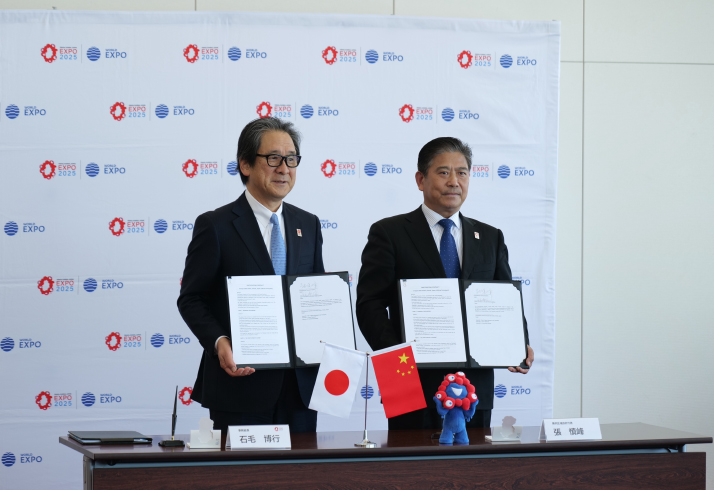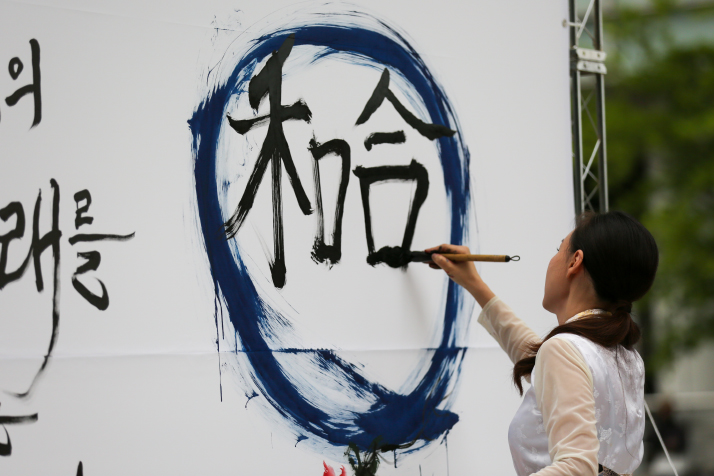| World |
| Meeting among Chinese, Japanese and ROK FMs contributes to warming relations | |
|
|
 Zhang Shenfeng (right), Commissioner General of the China Pavilion and Vice Chairman of the China Council for the Promotion of International Trade, and Hiroyuki Ishige, Secretary General of the Japan Association for the 2025 World Exposition, sign a contract for China's participation in the World Expo 2025 in Osaka, Japan, on April 27 (XINHUA)
Shake hands. Take a seat. Time to talk. After a four-year hiatus, the foreign ministers of China, Japan and the Republic of Korea (ROK) finally got together for their trilateral meeting in the ROK city of Busan on November 26. The three countries should play a more active role in promoting regional and global development in the face of accelerating changes unseen in a century and the slow recovery of the world economy, Chinese Foreign Minister Wang Yi said at the meeting with Japanese Foreign Minister Yoko Kamikawa and ROK Foreign Minister Park Jin. This face-to-face dialogue helps ease, to some extent, the current divergences among the three, while expanding cooperation in areas where they share common interests, Da Zhigang, Director of the Institute of Northeast Asian Studies at the Heilongjiang Provincial Academy of Social Sciences, told Global Times newspaper. The foreign ministers agreed to create conditions for a trilateral meeting of leaders and speed up preparations, according to a statement later issued by the Chinese Ministry of Foreign Affairs. Necessary sincerity The foreign ministers' meeting is an important part of the China-Japan-ROK trilateral cooperation mechanism established in 1999, which has developed into a system based on leaders' meetings and is supported by more than 70 working-level mechanisms as well as a trilateral cooperation secretariat based in Seoul, capital of the ROK. Wang said the mechanism has become the multilateral cooperation framework with the highest degree of institutionalization, broadest coverage and richest content in East Asia, which has served the development of the three countries and benefited the people of the region. According to China's customs data, trade between the three countries increased from $130 billion in 1999 to $710 billion in 2022, and their share of the global economic aggregate increased from 17 to 24 percent. However, since the last trilateral meeting between leaders of the three nations in Chengdu, capital of China's Sichuan Province, in 2019, high-level interactions between the countries had come to a halt due to a diplomatic stalemate between Japan and the ROK over the issue of compensation for wartime forced labor, and the deterioration of the China-Japan and China-ROK relationships partly as a result of Japan and the ROK siding with the U.S. to suppress China's development. According to Wang, following the policy of building friendship and partnership with its neighbors, China will continue to work with Japan and the ROK to bring trilateral cooperation back on track, as well as maintain sound, stable and sustainable development. The ROK and Japan are willing to mend ties with China because doing so is in line with their national interests, said Lu Chao, an expert on Korean Peninsula affairs at the Liaoning Academy of Social Sciences, adding that the warming of China-U.S. relations following the recent summit in San Francisco between Chinese President Xi Jinping and U.S. President Joe Biden has actually pushed Japan and the ROK to reach out to China. Jiang Yuechun, a senior researcher at the China Institute of International Studies (CIIS), echoed Lu, saying the positive signal of stabilizing China-U.S. relations and the increase in the scope of cooperation between the two countries, in reality, encourage U.S. allies such as Japan and the ROK to also improve their ties with China as well. "This will also generate more possibilities for future collaboration," he added. The three nations should uphold the vision of common, comprehensive, cooperative and sustainable security, and resolve differences and disputes through dialogue, consultation and peaceful means, Wang said, adding that scientific and technological innovation should be jointly carried out, people-to-people exchanges expanded, and the resilience of development enhanced. Park and Kamikawa also expressed hope that the three East Asian neighbors can carry out substantive cooperation in the fields of economy, trade, science and technology, digital transformation, people-to-people exchange, and environmental protection, and continuously expand common interests. The meeting will inject much needed stability into the region, as well as deepen cooperation and exchange between the three to offset the negative impact of current geopolitical tensions, Da said. However, "both Japan and the ROK should sincerely walk the talk," Lu added.  A participant performs traditional calligraphy of the Chinese characters Hehe (harmony and cooperation), the word of the year for 2023 chosen by the Trilateral Cooperation Secretariat, an intergovernmental organization between China, Japan and the Republic of Korea (ROK) based in Seoul, the ROK, at a cultural event in Seoul on May 30 (XINHUA)
More to come? As major countries in the Asia-Pacific region, China, Japan and the ROK should base themselves on the peaceful development of the region and the interests of the people to deepen regional cooperation, jointly address risks and challenges, and safeguard regional peace and prosperity, Wang said. China hopes that the three neighbors can give full play to their leadership in the region so as to bring more benefits to it, Li Min, a researcher with the Department for Asia-Pacific Studies of the CIIS, said. At present, however, Japan and the ROK follow the U.S. closely in attempting to contain China's development. This undoubtedly casts a shadow of confrontation in the region and creates uncertainties in trilateral cooperation, he added. For instance, President Biden and the leaders of the ROK and Japan in August at Camp David, the U.S., agreed to deepen military and economic cooperation targeting China, which would further jeopardize the region, Lu Yaodong, Deputy Director of the Institute of Japanese Studies at the Chinese Academy of Social Sciences, warned. China, Japan and the ROK should promote East Asia cooperation through trilateral cooperation, adhere to open regionalism, oppose ideological demarcation and resist turning regional cooperation into camp politics, Wang said. Noting that the continued tensions on the Korean Peninsula serves no one's interests, Wang said the top priority is to cool the situation, create the necessary conditions for the resumption of dialogue and take meaningful action. In November, tensions between the ROK and the Democratic People's Republic of Korea escalated after the latter launched a space rocket and sent its reconnaissance satellite into orbit. "We hope that Japan and the ROK can work together with China, view the trilateral cooperation mechanism from the perspective of common interests, assume their due responsibilities as major countries in the region, and take into account each other's strategic concerns," Lu Yaodong said, adding that only in this way can the mechanism be truly promoted to pursue peace, stability and development of the entire region. (Print Edition Title: Developing a Dialogue) Copyedited by Elsbeth van Paridon Comments to mamm@cicgamericas.com |
|
||||||||||||||||||||||||||||
|